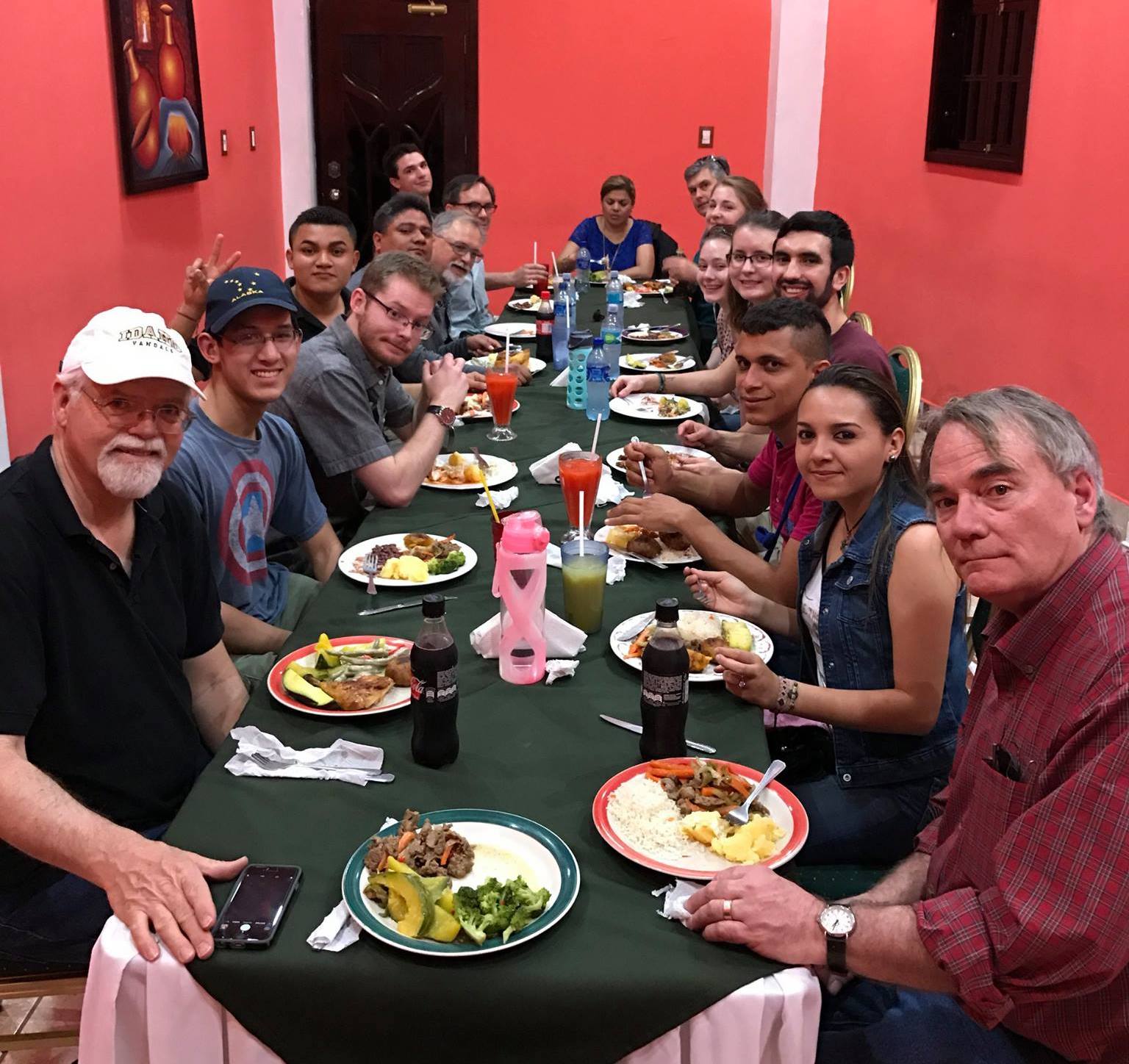
Joseph Roberts, a member of the team and one of their primary translators, kept a detailed record of each day. This is an abridged and edited version of that journal.
We arrived in Leon, Nicaragua, at 1 am.
Our hotel is right on the town square, which means we can hear everything that happens throughout the night. There is a fire alarm across the downtown area at 7:30 am. It’s impossible to ignore.
Leon is one of the hotter cities in Nicaragua, with highs of 100 Fahrenheit. It’s a gorgeous, sweltering heat that engulfs and fries you up.
Our hotel provides free breakfast. Breakfast in Central America is similar to their lunch. They had a rice and bean mixture, fried eggs, a piece of salty cheese, pineapple, and watermelon – it’s a hearty meal that propels you through the day.
And of course, coffee.
Nicaragua is a developing country, recovering from the revolution it suffered from 1979 to the 1990s. Leon is a beautiful colonial city, and one of the oldest towns in Nicaragua.
Leon is the Catholic city in Nicaragua, our friends tell us. The beautiful cathedral here is a great point of pride. From the roof, you can see the whole city and the eleven volcanoes in the surrounding area. Not all are active, but enough are, so that you can see the smoke climbing into the sky. The only buildings higher than three stories in the city are the Catholic churches, and 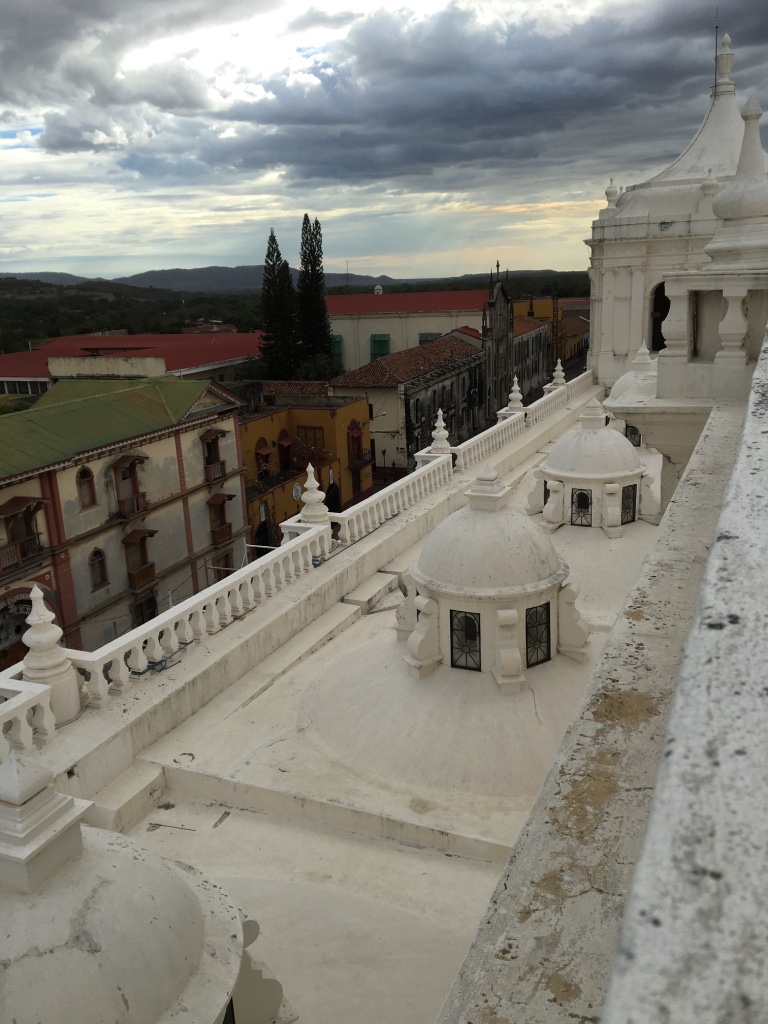 you can count them all from this vantage point. The wind is glorious.
you can count them all from this vantage point. The wind is glorious.
Inside, I see plenty of people praying to icons and the images of Mary. However, there are also many people who have lost all confidence in religion, our friends say.
Ralph Cooley, our trip leader started talking with a salesman called Juan, using a gospel tract in Spanish and English. Their conversation became complicated and I was called over to translate.
“If you died tomorrow, where would you be?” Ralph asks.
“I try to be a good person and I only drink a beer every now and then,” Juan replies. He described his disappointment with organized religion, seeing it as corrupted by leaders who claim divine revelation, only to take advantage of people.
The Nicaraguans are a very warm and friendly people. All you have to do is show up and smile. Your shorts give you away as an American tourist, because the men all wear jeans and dress pants, and the women wear jeans and dresses.
They all want to know why you are at their university, rather than the beach. They want your phone number and they want to hang out with you.
They take the initiative and are eager for conversation.
Our group is quite diverse. We have four college professors, seven American students, and four locals: Junior, the only full-time Cru staff in Nicaragua, and Sara, Marvil, and Uriel. The locals are having the time of their lives, excited to be working with a group who are ready and willing to share the gospel and strengthen their work.
Ralph, our group leader, looks like KFC’s Colonel Sanders to the Nicaraguan students and is always bright and cheerful. They’ll close their books or stop whatever they are doing to talk with this warm, white-haired man from Moscow, Idaho. Then, the next thing we know, Ralph’s surrounded by a group of students deep into a conversation over pictures in his Soularium game.
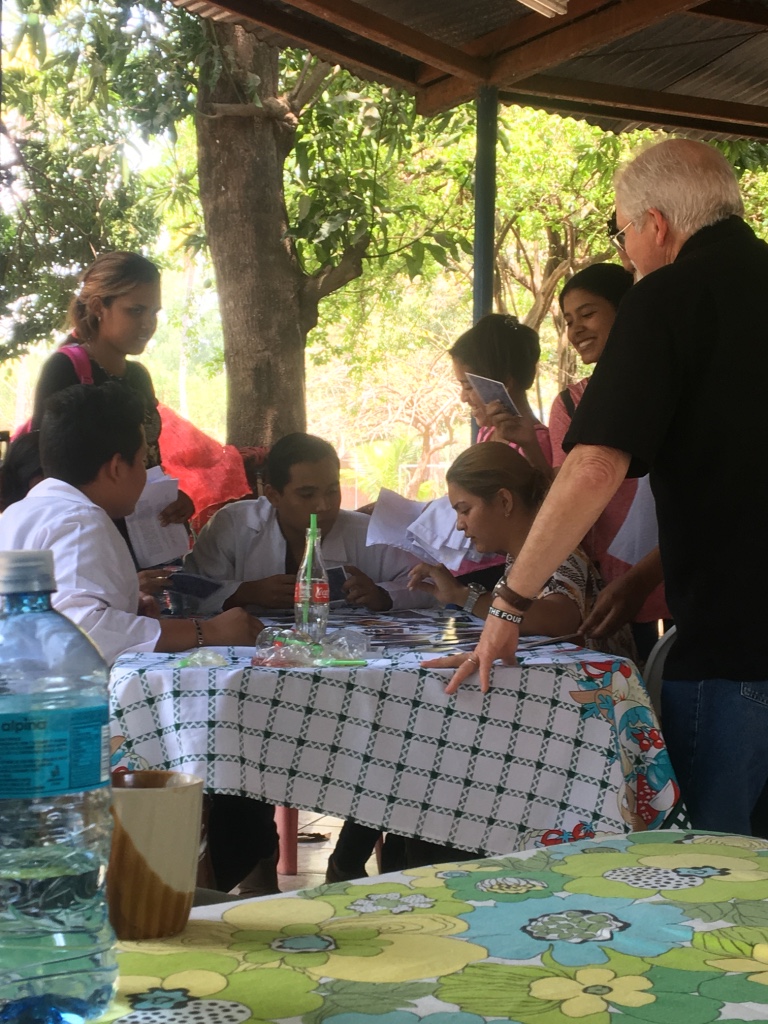
Soularium is a Cru tool designed to move a conversation from small talk into deeper issues. It’s a deck of about 50 cards, each with a different picture. To play, you ask someone to choose one or more pictures that describe how she sees her life today; what she hopes her life will look like in the future; her view of God and the afterlife, etc.
The students choose pictures of things such as a lady climbing stairs, or a picture of dollar bills. Soon, they’re telling you about their spiritual life completely unprompted.
* * *
The next morning, we traveled to Matagalpa.
This city is the northwest trading hub – right next to pure jungle. Farmers come from the hills and sell their fruit: pineapple, banana, papaya, watermelon. We passed rice, onion, and wheat fields in a short two minute stretch.
This is coffee country. You can see the coffee beans laid out on tarps to be dried by the sun, and smell their aroma.
Matagalpa is a rough frontier town, and you need to be careful to not garner any attention – although, a group of pale Americans stand out regardless.
Being here feels like traveling in time. You see ox carts and pigs in the sidewalk next to a taco place. The people here moved from the bronze age to modernity within 30 years.
On the same street, you see extreme poverty beside the latest Ford model truck.
Joining a group of local Christian faculty, students, and a pastor for dinner at a pizza place, our team presents a short workshop on sharing your testimony in a professional setting, which I translate.
The pizza arrives, and now I ask them questions about the spiritual state of Nicaragua. The country is 55 percent Catholic, they say. And while another 40 percent claim to be evangelical, there is little depth in their faith.
The largest denomination is the Assemblies of God, the pastor explains.
“But their seminaries are not sufficient to equip pastors,” he says. “And that is all the training they are given.”
On top of that, following complaints about loud church music, some cities have assigned specific districts or street blocks for churches. This leads to multiple churches placed within one city block, where the pastors compete over members and have no notion of working together.
Most churches are high on energy and low on doctrine, the pastor tells me. But there is hope. He’s working with Highland Missions International – a group who is seeking to bring more Bible teaching to the country.
* * *
Our university contact and guide is Jenny. A native of Matagalpa and a Cru volunteer since she was 14, Jenny teaches English at the government university. She is passionate to see her city and universities reached with the gospel.
The doors and windows are wide open in every classroom we pass, and the students gawk as we walk by.
At the private university campus (UCC), we are greeted like a group of celebrities. The university administration, while maintaining a professional appearance, are ecstatic that four American PhDs would walk onto their university and ask to give seminars for the students.
Having these professors – something almost never been done before by Cru – opens up all kinds of opportunities. It’s crazy to think what our success here can mean for Cru in the future.
Ralph, Connie, the four professors, and I, sit in an air-conditioned room and talk about partnership possibilities and the sessions they will arrange for our professors.
Having our American professors speak at UCC could raise the university’s prestige, and build potential for future alliances with our professors’ own universities, they think. We may be thriving in ambiguity, but we won’t reject the offer to speak about our experience in the academia and give our testimony.
Meanwhile, the rest of our group is out on campus, meeting with students and doing evangelism. It’s hard not to feel restless when you are supposed to sit pretty with the old people while your age group is out there talking with the Nicaraguan students and leading them to Christ. Later, I heard that two students had made decisions for Christ, and our young people have set up several follow up appointments with students.
I’m amazed at how the Nicas will stop doing their homework or drop whatever conversation to listen to us talk. They love the opportunity to “have a cultural exchange.”
We finally leave the air-conditioned room and find the university cafeteria. I join Ty and Ben, talking with three students outside the cafeteria, after a game of basketball.
It’s hard to move from small talk to deeper things, and as the translator, I’m constantly tempted to take over the conversation in Spanish, cutting my English-speaking friends out of the conversation.
They have good food in large amounts, and it’s dirt cheap. I pay about $2.50 for grilled chicken with a cream jalapeño sauce accompanied by a salad, rice, beans, and banana chips. The menu can be rather entertaining. My favorites are “Chicken Gordon Blue,” and “posicles” (popsicles).
Smoothies are also very popular here, and I have found that they are essential for survival. They have a lot of sugar and they keep you hydrated. The fruit down here is amazing, so having a mango, papaya, strawberry smoothie is just delightful.
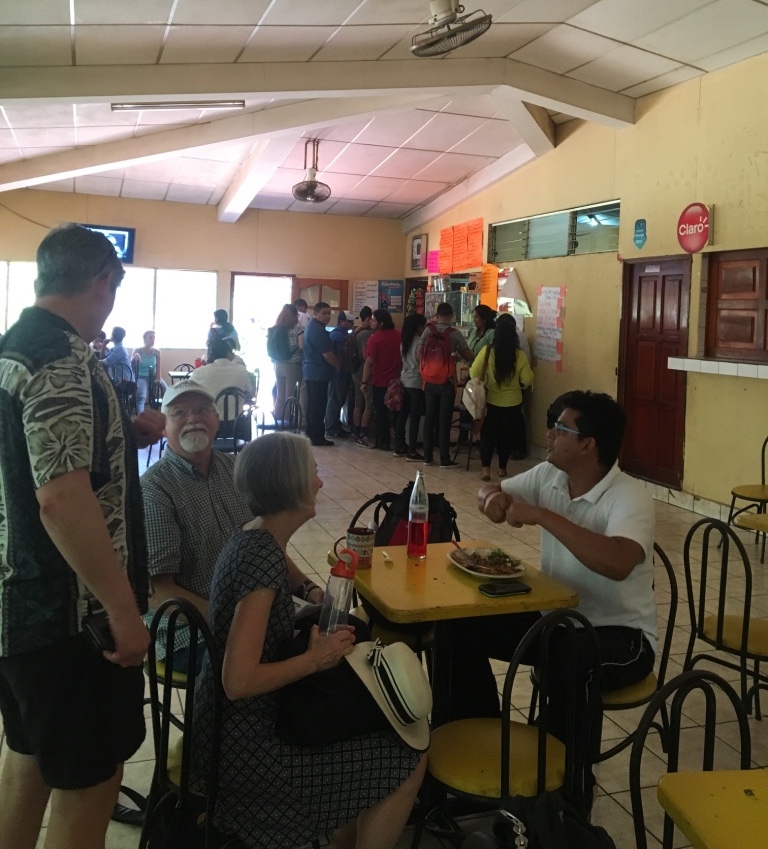
In the evening, we are back on campus – this time at the government university language school (UNAN). We were invited by the director, a Christian, to visit the evening English classes and help the students practice.
I count us into three groups, and we split ways. I’m with Ty and Trudy.
There are 14 english levels here, and we walk into the level 10 class.
The teacher – from California – unsure of what to do, simply turns the class over to us and sits down with her dinner to watch. Just like that, we find ourselves standing in front of 10 students expecting us to teach them base form, infinitive, and gerund forms.
With no Google available, the English grammar I had learned from Latin saves the day. The teacher is happy and glad to have us come back tomorrow.
* * *
Today is huge. The UCC has set up four talks for our professors.
The sessions are on Business Marketing with Dr. Mark Pritchard, International Studies with Dr. Brent Richards, Microbiology with Dr. Scott Minnich, and Landscape Architecture with Dr. Stephen Drown.
I’m assigned to translate for Dr. Mark Pritchard. His talk is on marketing – you start with a need, you design a product that meets the need, and then you tell people about the product.
The lecture hall is packed with students of all grade levels – year one through five. Every chair is filled, and students and faculty are standing in the back.
Mark uses Harley-Davidson as an example: They tell people that a motorcycle gives you three things: power, control, and freedom.
“Harley is using the innate spiritual needs that every human has and tries to meet them with a material product,” he says. “Even though a motorcycle might make life more enjoyable, it cannot meet your ultimate needs.”
It’s very hard to read Nicaraguan people’s faces. They might look completely withdrawn and inattentive, but those are the ones paying the closest attention. Or not at all. You can’t know until they talk, and they can be shy and scared of asking questions.
“Do you really think about Jesus when you make a commercial?” A professor asks at the end.
“Faith and profession are not two separate things,” Mark answers. “Your beliefs will shine through your work.”
As we wrap up, the students clap and the teachers thank us for coming.
It’s hard to quantify an event like this. Sure, there were at least 80 students and faculty in the classroom, but only God knows whether the seed fell on good soil or not.
We leave the classroom to eat lunch in the cafeteria.
The lady smiles knowingly when all these cheles – Americans, or gringos – approach the stand. She knows we are a clueless bunch of hungry people. I do my best to order the food for whoever is with me, but they have different names for everything, and even though we are both speaking Spanish, I feel like we are speaking past each other at first.
As I sit down, Ralph tells me Dr. Minnich has a talk at the UDO university in an hour, and I’m going to translate. I look at my food, then at Dr. Minnich.
His talk will be on his research on the E. Pestis and how the loss of DNA information actually makes it more dangerous.
I can hear Dr. Gordon Wilson – my natural history teacher at New Saint Andrews College – saying that this is why his class was so important. Because – who knew when I’d be standing in front of over a hundred medical students, translating a microbiologist lecture that has words like pathogens, flagella, white cell receptors, frame shifts, impressions, and phagocytosis?
Right. Thanks. Because that would never happen.
As I stuff food down my throat, Dr. Minnich walks me through his slides and I write all the technical vocabulary on three-by-five cards. I’ll use the UCC office wifi to look up the Spanish equivalents, I think. Thankfully, as I write them down, Dr. Minnich carefully explains each term.
In my remaining 20 minutes, I run over to the office. Of course, the internet is down.
So, I sit down and come up with equivalents or definitions that I could explain in the talk as best I can.
This is going to be a wild ride – working with a microbiologist who can say things like the pathogen is phagocytized by a nuclear membrane and is flooded by chlorides – or something smart like that.
I’m well rested, and I’ve just drunk a “charged” iced coffee, so I’m not worried. This shaking is just the caffeine, I tell myself.
I’m always surprised by how brain dead I feel after translating for an hour. It feels like my brain was put on a treadmill on the fastest setting, and you can’t pause it. Everyone is looking at the speaker, and they expect you to do a good job. Now.
I love this though.
I love to be the bridge and help the audience connect with the speaker. For me, it’s a metaphor for what pastors and missionaries do – how they connect their audience with the knowledge of God.
Without air conditioning, the lecture hall is very warm, and built so the 120 seats look up to the raised stage, so I feel self-conscious in shorts. The students wear dress pants and medical uniforms that correspond with their studies in nursing, medicine, microbiology, or pharmacology.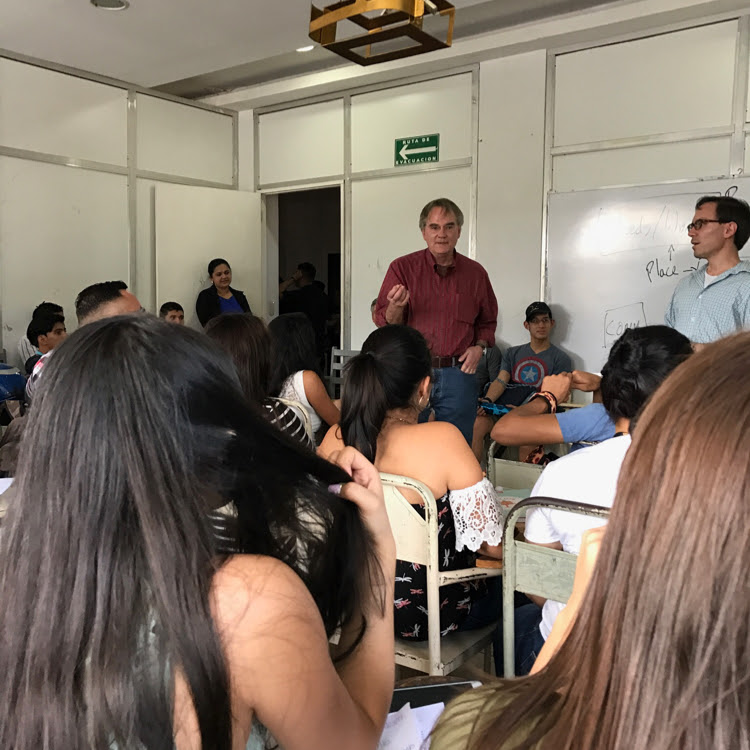
Again, the room is packed, with people standing in the back.
Dr. Minnich shares how he used an idea sparked by C.S. Lewis in Mere Christianity to further his research.
“Lewis wrote that moral evil is just a corruption of the good. It takes something that already exists and perverts it,” he says. “Evil is a parasite.”
In his research, he and his students added different peptides to the strain E. Colicorel-something to see what it takes to mutate it into the dangerous E. Pestis. But nothing happened.
“Only after I thought that maybe natural evil behaves the same as moral evil – that it’s just a corruption of the natural good that we made progress,” Dr. Minnich says.
He realized that E. Pestis lacks a key feature, which prevents the cell from detecting the pathogen.
“So, the loss of DNA information makes the infectious disease more dangerous and virulent,” he concludes, quoting from Romans 1:
“…Since the creation of the world His invisible attributes are clearly seen, being understood by the things that are made…”
The students and faculty are stunned – if only you could see their faces.
After 15 minutes of questions, the head professor gives effusive thanks to Dr. Minnich and tells the students that listening to this kind of research given by an experienced professor is such a blessing and unique opportunity. Then there are many formalities and pictures which will probably make it into all sorts of university newsletters – with me in shorts beside sweaty dress shirts and pants.
As we’re busy with all that, a lady approaches me and asks about the verse Dr. Minnich quoted, and I explain further.
“I’ve never heard anything like this before,” she says. “Faith and academy never meet.”
Someone left a “Would you like to know God personally?” booklet in Spanish on a bench, and she hands it to me, saying we’d forgotten it.
“Please keep it – you can read more of what Dr. Minnich was talking about in it,” I say with a smile.
Serving as a translator, it’s very rare that I get to actually talk with someone myself. But here, finally, I was talking and these were my words. It was so refreshing.
And then faculty talking with Dr. Minnich call me over to translate again, and the moment passes.
I don’t know the teacher’s name, and I will probably never know the rest of her story. But I know she was touched by Dr. Minnich’s talk and she was thirsty. I can only trust God and pray that she will join His kingdom.
Later, I hear that while Dr. Minnich talked, Ralph sat in a courtyard on campus and played Soularium with a group of students, leading to nine decisions for Christ.
We hurry back to the hotel and eat before we’re expected at the language school again, and I get another smoothy. If you ever go on a mission trip, the essentials are: Bible reading, prayer, someone you can talk to, coffee, and fruit smoothies charged with sugar.
The work at the UNAN can seem a little strange. I am literally only teaching them English grammar. The teacher, Judy, loves us though and lets us have run of the classroom.
I talk about when to use gerunds and infinitives, and Trudy talks about prepositions. She has a major in Chinese with a minor in Spanish.
On Thursday, we’ll have an informal party with the students so that they can talk with us about who we are and why we are here. Right now, they’re still trying to understand why we’re in their classroom, and they’re looking forward to Thursday to talk with us as much as we are.
* * *
I walk with Dr. Bent and Ben to the “Mexican” food truck – it’s run by Nicaraguans and they don’t even have salsa!
There, I break my unspoken rule here in Nicaragua to not give anything to beggars. There are beggars everywhere – you can’t order food without having at least two ask you for money. If you give one of them money or buy them food, two more appear.
But, this barefoot kid, after I tell him we have no money, he tries to buy food with six cordobas, which is like $.05, and the cheapest thing was probably a dollar.
I tell him I will buy him a burrito. He pushes his luck and asks for a coke; I say no. He has a coke bottle tucked beneath the neck of his t-shirt, and the plastic bottle smells like glue.
“What are you doing on the streets?” I ask him.
He is fourteen, he says. He’s from a different town, but he’s stuck here after his mom abandoned him.
“I’d like to leave Nicaragua – so I won’t have to eat rice and beans again,” he says.
“You know, your troubles will follow you wherever you go,” I say.
It’s hard to share the gospel with someone whose brain cannot think because he’s a glue sniffer, but I do what I can, and I give him a booklet. He promises to read it, but what are the odds? He wants shoes, but I’d have to go barefoot then.
Back at the hotel, it’s getting late, but I can’t sleep yet. I’m sitting on a window ledge, watching the people pass and thinking. My heart is too full. Today we went to battle, and I’m physically, emotionally, and spiritually drained.
With our sporadic and mostly spontaneous schedule, I’ve had trouble finding time to read and pray. When you are exposed that long to the spiritual struggle of so many students, your heart ends up raw, and you can easily bleed.
Marvin, one of our Nicaraguan friends and a Cru volunteer, joins me.
We start to talk, and I can’t help tearing up.
Marvin has a great thirst to learn more about God and his word, and I know that his life here – trying to help young believers – is going to be hard. So many call themselves Christian, yet do not understand that trying to be good is not enough to save them. Life has never been easy for the Church, and I tell him story after story of Christians in the early church and missionaries throughout history who gave their life, either through a single sacrifice, or through daily humble service.
* * *
I get up early and recharge my batteries at the coffeeshop next door.
The lady there knows who I am. Iced coffee with milk, no sugar, to go? Yes. I smile, pay my 35 cordobas, and find a table to read. I have been working through the Psalms.
At UCC, I’m working with the English director there to set up an activity with the English students. When we arrive, she greets us, thanks us for being so willing to help, and divides us into five groups.
The teacher for our class is actually sick, so we’re in charge. Weird. But normal now. We breeze through their normal classwork in 10 minutes, and have plenty of time to play Soularium – I mean – English speaking practice.
The pictures my group choose lead our conversation directly to religion. I have two protestants, two Catholics, and an atheist. I tell them that if they wanted to hear more, they can catch me at lunch.
In the afternoon, we go to the government university (UNAN) – medicine branch, to check on the arrangements for tomorrow.
The dean there promised us a room for us to talk with the students – another door that Mario opened for us.
Mario is like a Christian mafia boss or something. He knows everyone, and everyone says hi to him as they walk by. I think this whole trip would have been far more confusing and less productive without all his connections.
But when we arrive at UNAN, Mario isn’t here.
So Ralph divides us into groups to wander around the campus and talk with students. It’s great to engage again in evangelism.
And then we visit the dean’s office. He’s not here either.
But the vice-dean is, and she flips out when she hears that, one, there’s a meeting going on tomorrow that she knew nothing about, and two, there’s a group of around 12 Americans talking about faith on campus.
She goes out to try and herd us all into the office, saying that we need to wait in there for the dean. I tell her that most of us in the group are not pertinent to the meeting and that we would rather wait outside.
She says no, and I call for Ralph.
He explains the situation – that we are not crashing the campus, and that we are just trying to find out details about the meeting.
She leaves in a fuss for a quick minute to gather all the administration in the university. She has Ralph, Mark, and I go into the office and begin to talk as we wait for the dean. She introduces the five other people around the large table in the office – all directors of student activities and administrators of something or other important.
I translate as Ralph, in diplomacy mode, talks about Cru and its involvement in 123 different countries, and our hope to make partnerships with Nicaraguan universities. He mentions our success in the private universities and the academic events we had the day before, and how we would love to help out in the public universities also.
I warn Ralph to not to bring up the language school, as we’re probably not supposed to be there, but the director of the language department loves us.
The dean finally walks in, and Ralph continues to explain the situation.
The dean says said he did seek permission to have some sort of event for us tomorrow, but the process usually takes 15 days. Watched by the administration and without Mario, he’s much more formal and reserved than the first time we talked with him.
“Does that mean we can’t go around campus talking with students and having a ‘cultural exchange?’” We ask.
He says no, any kind of activity needs to go through the university process. “However, I’m very open to plan for the next group. I’ll need a very specific description of everything you would like to do, names of the people in the group and passport numbers,” he adds, as the vice-dean nods emphatically.
The ironic thing about this super long meeting is that while the vice-dean tried to herd us in and prevent us from sharing the gospel with the students, her plan backfired as she’d gotten all her cronies in the room, and only three of us. The rest of our group was having a great time talking with students.
* * *
I get myself a batido and a burrito from the ‘authentic’ Mexican food cart. The guys there like us, and the young guy had been listening intently when I shared the gospel with the young beggar yesterday.
I run back to the hotel and scarf my food down. There’s not much time before language school. The teacher had shown me the material she wanted us to work on today, but I tell Trudy that I would be happy to just observe today. She agrees. We’re both exhausted, and two more hours of teaching and being engaged would be a challenge.
I walk into the school wearing shorts, no socks, and still working on my smoothie as I pass a sign in Spanish that says all food and drinks are prohibited in the building.
I head up to our classroom on the second floor with Trudy, but we are intercepted by another teacher.
“Are you guys only going to the higher level English classes? I found out about you guys coming here and I just wish I could steal you to my classroom so my students could get some experience, but they are just level one, so they don’t matter,” he says, making puppy eyes at us.
“Well, we are only informally here, and we could probably swing by for a bit.”
“I don’t want to get into any kind of trouble with the director. Would you get in trouble?”
“Nah, let’s see how things are with Judy and see if we can come over for a few minutes.”
“Awesome, that would be great. By the way, what organization are you with, are you guys talking about Jesus with the students or something?”
Trudy and I look at each other. I’ve been more cautious since the UNAN incident, and I don’t want to get kicked out of this school too.
Minutes ago, I’d been talking with Dr. Richards, who had asked if I’ve ever considered being a lawyer. My oldest brother has told me that too. Apparently, I can be shifty. This is the time to be shifty, I think.
“We are with Cru – a student organization in 123 different countries,” I say, carefully. “We get to learn about a different culture, and the students here get to practice their English and make new friends.”
“What does Cru stand for?”
“Campus Crusade for Christ.”
“Ah! Cruzada Estudiantil? My wife was part of that five years ago! By the way, I am a pastor and I teach English in the evenings. I really appreciate what you guys are doing. The students definitely benefit from you.”
He gives us his card and my eyebrows stop sweating. I feel like we dodged a bullet.
After a few minutes in Judy’s classroom, we visit his. It’s great fun interacting with the pastor’s class. There are only seven of them, and most are 15 or 16 years old. We introduce ourselves, and they ask us to say things in languages other than Spanish and English. Trudy introduces herself in Mandarin Chinese and I in Latin. We have their hearts from that moment.
They ask all kinds of questions and in the end, we invite them to the Thursday party after the test. This level doesn’t have a test, we learn, so they will be able to come earlier. The pastor thanks us again and promises to drag them all down to the party.
I like that guy.
Back at the hotel, Mark asks, “Are you ready for the radio tomorrow?”
I turn and look at him. “First time I heard about it,” I say, not too shocked. Anything can happen this trip, so why not speaking live on the radio?
“Yeah, we’ll be talking about our work here at a Christian radio station at 8 am tomorrow. I believe you are translating,” he says.
Tomorrow is going to be a full day, I think, sitting in my favorite spot outside the hotel, watching the city. We have the random radio show, the English activity at the UCC, then the party at the UNAN language school.
* * *
I eat quickly before getting my usual iced coffee in the coffeeshop next door.
Ralph is going around checking on the professors. Apparently, no one told Brent about the radio show, so he isn’t ready to go, even though he’s been awake since 5:30 am.
This is a pioneering trip, and it’s next to impossible to keep everyone informed of the plan if you don’t know the plan, so sometimes there are casualties. So Brent raced to get ready.
This radio station has quite the reputation. A Costa Rican poll named it the second most reliable station in Nicaragua for news, sports, etc. So even though it’s a Christian station, they have more than just music and sermons.
At the station, Junior, the Nicaraguan Cru staff guy starts writing the professors’ names down. “What’s his name again?” He points at Dr. Minnich. “Dr. Money?”
To our amusement, he continues to call Dr. Minnich that, so Dr. Minnich dubs him “Senior” in return.
The station is a small place with three rooms: a waiting room, a room with three microphones on a table, and a third with the broadcasting equipment and one more microphone.
Only two of the microphones work in the middle room, so I’ll have to translate on the separate microphone in the other room. I won’t be able to see their faces or anything. I won’t say I’m nervous, but I’m definitely uneasy. A translator usually has to remind a speaker to shorten sentences, and understands a lot through body language. All I’ll have are voices coming through a speaker.
 And we’re live.
And we’re live.
The show starts a little rough, because as soon as the speaker read the names of his guests, Mario nudges me and says, “Say something.”
I turn to him completely confused. I was told to translate, not begin the whole thing!
I say something like “It’s nice to be here,” and the guy starts interviewing Ralph.
Ralph talks about why we’re here and what we’ve accomplished in the last five days. Then, each professor introduces himself and talks about his field of study. Brent is able to go farther because he speaks Spanish.
* * *
We find the classroom the director of the English language department has provided for us for our planned English practice activity.
Mark, Dr. Minnich, and I sit in a circle with group of about seven or eight students in beginner level English. Using Soularium, we go around the circle and each student explains why they chose whatever picture. Most of them want to travel or be successful.
On his turn, Dr. Minnich chooses the picture with a fishhook. He says he likes fishing, but also, he’s been thinking of the passage where Jesus tells his disciples that they’re going to be fishers of men.
“I want to be a fisher of men, and I want to catch all of you!” Dr. Minnich says, and cheerfully points the picture at each of them.
I’m not sure how the students are going to take it, but I translate. One young guy leans forward on his desk chair and asks Dr. Minnich how he became a Christian.
Dr. Minnich says he grew up in a Christian home, but then left the faith, only to come back later. He also tells them that we are all infected with a disease and Christ is the cure.
Then, a different student points at Mark “What about you?”
Similar to Dr. Minnich, Mark began in a Christian family, but when he went to college, he left that to see what the world had to offer. He thought that maybe the next thing would finally bring him happiness – the right car, job, girlfriend, etc. Then having defended his dissertation successfully, he thought that now he should feel happy, but he discovered that the opposite was true.
This brought him back to Christ.
If you could see the eyes of the students – realizing they’re on the same trajectory – thinking that maybe the right job, or leaving Nicaragua, will make them happy.
Talking with Scott and Mark after the students left, we agree this conversation was one of our happiest experiences in the whole trip. We clicked as a team, the students listened, and both Dr. Minnich and Mark were asked to share.
Next on our agenda is a meeting with the Christian students in the university. This is to talk about setting up a Cru movement at their university. To my great surprise, most of the students who had been in our group just 10 minutes ago, were here for this meeting.
The meeting is run by the Nica part of our team, who will visit them and make sure the group continues to grow.
It hits me that we are almost done with our work in Nicaragua. My heart starts to beat faster – it’s that feeling you get when you are running a long race, take a turn, and suddenly you see the finish line half a mile away. We’re all very tired, but we’re almost done.
There is still the party for the English school students at the government university. We pile into the van and take off.
Once again, I’m wearing shorts, no socks and I’ve got a smoothie in my hand – those things probably kept my brain alive.
In our designated classroom, we move all the desk chairs to make room for tables to play Soularium and to hold snacks and drinks.
We sit down and wait for the students.
I run up to the Level 1 class and tell them we are ready. They come down and we start to play. We talk about their lives: they’re all in high school. They attend regular school and then come here in the evening. Work work work. No wonder some of them look tired.
The whole is relaxed, happy to be done with tests, and enjoying the conversation.
The rest of my evening is spent inviting students into the classroom, checking in on different groups, picking up trash, and talking with the director. Soon enough, it’s time to go.
We clean up, arrange the desks and say goodbye to the director. We talk about future teams coming down and working with the students.
“I think it would be nicer for the students to have more time with you guys outside of the classroom, where it can be more informal and they get to know you guys,” she says. She wants to give us carte blanche for the future.
* * *
This morning, we pack up and get ready to go. I walk over to the coffee shop one last time.
The same lady is there, smiling when I walk in. Iced coffee, with milk, no sugar, to go? She has it down.
“What is your name?” She asks.
“Joseph.”
“I’ll know for the next time you come.”
“Well, we are actually leaving Leon today. I should have told you my name the first time I walked in.”
“No worries; next time you visit. When will that be?”
“I don’t know. I might never return.”
She smiles. “God knows.”
She looks at my wrist. Ralph gave us these bracelets with four symbols on them to help you present the gospel. I hate bracelets, but I’d put it on for no good reason this morning.
“I’ve seen several of your group wearing that bracelet and I have been wondering for days what it means.”
I rest my hand on the counter and show her the four symbols. “These symbols here stand for four things. This heart means that God loves you and all mankind. This division sign means that we sinned and are separated from the presence of God. The cross here tells us about Christ’s sacrifice for us, his gift so that we can be restored to our relationship with God. The question mark is a personal invitation; what are you going to do about it? Will you take God’s gift?”
I slide the bracelet off. “Would you like to have it?”
“I’d love to.” I hand it to her along with a “Would you like to Know God Personally?” booklet.
“This explains more in depth what I just told you.”
“Thanks!”
“Have a great day. Hasta luego.” Just getting coffee.
How do you measure success? Do you add up people as numbers and show the statistics, or do you just do your thing call it good and forget about it? I have thought a lot about what it would mean for this trip to be a success. We came here, not really knowing what we were going to find. We asked God to use us, and I believe he did.
We have statistics for the work we did, but in the end we don’t really know. We don’t know what the harvest will, or how much fruit it will give. But something I do know is that God is faithful with His promises. When it’s my turn to share my trip takeaway with the group, I quote Psalm 126:
“Then they said among the nations,
The Lord has done great things for them.
The Lord has done great things for us,
And we are glad.
Bring back our captivity, O Lord,
As the streams in the South.
Those who sow in tears
Shall reap in joy.
He who continually goes forth weeping,
Bearing seed for sowing,
Shall doubtless come again with rejoicing,
Bringing his sheaves with him.”
I cannot wait to see the harvest when God brings in the sheaves.
The team was able to have 66 spiritual conversations with faculty and students, and 109 gospel conversations. Through classroom lectures, an additional 450 people heard the gospel, and 16 Nicaraguans made decisions for Christ!
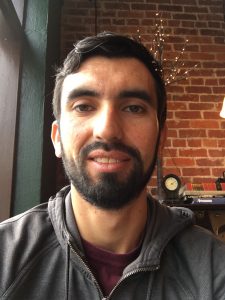 Joseph Roberts is a “missionary kid” from Aguascalientes, Mexico. He’s working toward his Masters in Theology and Letters at New Saint Andrews College, in Moscow, Idaho, where he earned his undergraduate degree in Liberal Arts.
Joseph Roberts is a “missionary kid” from Aguascalientes, Mexico. He’s working toward his Masters in Theology and Letters at New Saint Andrews College, in Moscow, Idaho, where he earned his undergraduate degree in Liberal Arts.
He speaks four languages, and is currently learning his fifth – Hebrew. He teaches history to a great bunch of kids at a homeschool co-op: White Horse Hall. He loves soccer, volleyball, running, and cooking.
